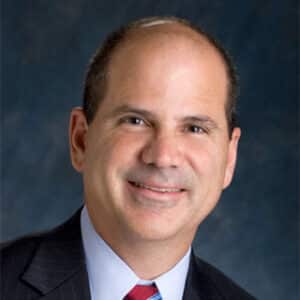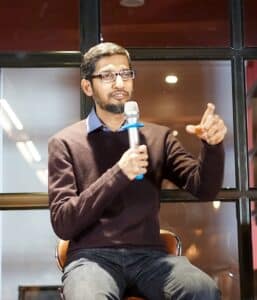Leadership Leader
Seems like I’ve been reading a lot over the last few years about activist investors shaking up a company’s leadership – sometimes successfully and sometimes not. Some recent examples include Proctor & Gamble, Nestlé, Samsung (this month’s Leadership Laggard), insurance giant American International Group (AIG), railroad CSX Corp., Buffalo Wild Wings (June’s Leadership Milquetoast) and Avon. Sometimes just the threat of a proxy war can influence leadership to accommodate the investor’s desired change a company’s direction.

There’s definitely some “he-said, he-said” going on, and I have neither the time nor the inclination to sort out the alternative facts, but Rodriguez was definitely not going to kowtow to an investor who’s stake in ADP is still in stock options.
A couple of things we believe here at Triangle: no one gets their own facts, and you can make numbers support any position you want to take. 58% of statistics are made up, anyway.
Billionaire hedge-fund manager Ackman wanted ADP to reduce “corporate bloat” (who doesn’t, except the bloat), accelerate investment in back-end improvements and product migrations, and increase sales force productivity. I’m fine with those suggestions, although they’re hardly fresh ideas.

Rodriguez has been with ADP for almost 20 years and has a track record of successful performance and effective leadership. Ackman, who’s recent investments include Chipotle (last month’s Laggard), J.C Penny’s, Target, and Valeant Pharmaceuticals, has been an ADP investor for barely a month. But, I don’t have to pick a side.
Recognizing a CEO who bucked the trend and stood up to a bully investor, we congratulate Carlos Rodriguez for being named Triangle Performance’s August Leadership Leader.
Leadership Milquetoast

Lots of aspersions have been cast on Damore, many pretending that he said things he clearly and openly dismissed in the memo itself. Damore didn’t say that women are biologically unfit for tech, or that diversity is bad, or that sexism doesn’t exist.
I’ve read Google’s code of conduct; to say this guy violated it is a stretch in reasonableness, and requires interpretations not in evidence.

With this broad interpretation, they can hide behind most anything as a code of conduct violation. The manifesto did not harass, intimidate, show bias (except to use bias as a clear foundation of error), and was not unlawful discrimination. At most, it hurt someone’s feelings. Get over it.
And don’t forget–Google sucks (that’s the technical term) at diversity already. They needed the catalyst for conversation this could have created. Instead, they got bupkus.
If the guy is completely and absolutely wrong, then there is zero reason why Google shouldn’t have positive diversity representation, meaning their significant lack of representation today (or really any meaningful progress at all) must be willful and intentional.

|
“Once you eliminate the impossible, whatever remains, no matter how improbable, must be the truth.”–Arthur Conan Doyle |
It’s not a free speech issue per se, since companies aren’t required to allow constitutional free speech (that’s between government and citizens), but it certainly smacks of retaliation for disagreeing with a position. At a bare minimum, it has created a seriously chilling effect on open dialog around diversity and inclusion.
Google–and virtually every other tech company–should get their own house in order before bullying others to suppress opinions. We need diversity—real diversity—in organizations today. I see it as a business necessity for future success. But Pichai, that’s a really dumb way to go about it.
Talk about a missed opportunity. These sorts of conversations–in the open–are what real diversity and inclusion efforts are missing. Google will never have another chance to have an open dialog around these topics (with those who may have different thoughts). No one will ever dissent again publicly. They blew that big time.
That was an unforced error, Sundar Pichai, and it makes you this month’s Leadership Milquetoast.
Leadership Laggard

So, we settled for spotlighting his son, Jae-Yong Lee, aka Jay Y. Lee, and one of two Vice Chairmen of Samsung Electronics who was sentenced last week to five years in prison for bribery, embezzlement and hiding assets overseas.
Remember ousted South Korean president Park Geun-hye? Lee and some of his colleagues have been accused of bribing Park and a “friend” to the tune of $17M in donations to organizations affiliated with the friend and an $800,000 horse for the friend’s daughter to ride. Lee needed government support to merge a few companies in the Samsung Group to strengthen his family’s control. Apparently, the move wasn’t particularly popular with non-family investors.
So, why are we picking on Lee, since he wasn’t alone in the scheme? Because he expected to be treated like the heir apparent when he didn’t know squat about leading or running the business. He was a figurehead who clearly wasn’t busy enough to stay out of trouble. He said it best himself at his trial: “There was no line of approval involving me. I had no knowledge to make decisions, nor the competence.”

Think what they might be able to achieve with him behind bars for five years!
Leadership isn’t about titles and control; that’s dictatorship. For his refusal to take responsibility and his clear lack of leadership, we’re pleased to name Jay Y. Lee this month’s coveted Leadership Laggard.

